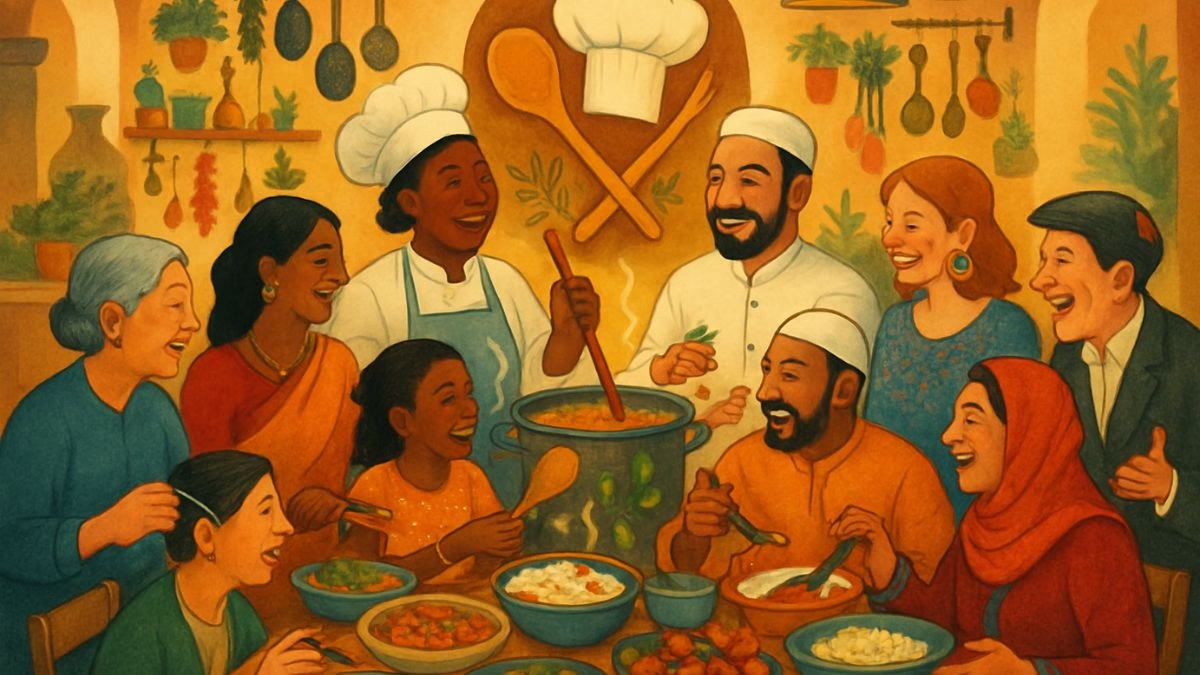Brief Listening-Skills Introduction (Tips)
In international exams, you’re often tested on structure (signposts like “first,” “however,” “in contrast”), purpose (why the speaker says something), and inference (reading between the lines). For this listening, preview the topic and anticipate examples (community kitchens, festivals, negotiation dinners). While listening, note frameworks (problem–solution, case studies), stance markers (cautious language like “arguably”), and cause–effect connectors (“as a result,” “therefore”). Afterward, revisit your notes to distinguish the main claim from supporting details.
Micro-Introduction to the Topic (Anticipation)
You’re about to hear a lecture arguing that food isn’t just nourishment—it’s a form of diplomacy. Expect references to rituals, shared kitchens, and tasting events used to de-escalate tensions. The talk will likely explain why these activities work psychologically and socially, and will include examples from community programs and cross-border initiatives.
Keywords & Phrases (Used in the Script)
Culinary diplomacy — using food and food-related events to foster understanding and goodwill; we use it to frame the lecture’s central argument.
Palate — a person’s taste preferences; we use it to show how tasting expands openness.
Ritual — repeated, meaningful actions like breaking bread; we use it to explain predictability and trust.
De-escalate — reduce the intensity of conflict; used to describe what meals can achieve.
Commensality — eating together; used to highlight social bonding at the table.
Provenance — origin of ingredients; used to connect food to stories and identity.
Reciprocity — mutual exchange; used for gift-giving and hosting norms.
Mise en place — kitchen setup; used metaphorically for preparation in dialogue.
Ambassadorial — acting like an ambassador; used for cooks or hosts representing communities.
Cross-pollination — mixing ideas or flavors across groups; used for menu design and teamwork.
Tacit — unspoken; used for the quiet messages food sends.
Bridge-building — creating connections; used as the broader goal of shared meals.
Fault line — division or point of tension; used for social or political divides.
Stewardship — responsible care; used for co-hosting and sustaining trust.
Microcosm — a small model of a larger system; used to describe the dinner table as society in miniature.
Listening Audio
Listening Transcript: Please do not read the transcript before you listen and answer the questions.
Culinary diplomacy is the art and practice of using food to make conversations possible that would otherwise collapse under the weight of suspicion. It appears simple—invite people to eat together—but it works because meals are quietly choreographed rituals, and ritual is a stabilizer. When a situation is volatile, unpredictability fuels anxiety. A meal, by contrast, has a structure our bodies already understand: a beginning, a middle, and an end; plates arrive and are cleared; the palate awakens, relaxes, and resets. That predictability is not trivial—it is the platform on which trust is built.
Consider how a table functions. It is flat, shared, and literally supports what we all need. That physical reality becomes metaphor: we are supported together. Commensality—the practice of eating together—encodes reciprocity into every gesture. I pass you the breadbasket; you pour me water. In this choreography, dominance lowers its shoulders. The ritual of passing, of waiting one’s turn, of tasting before judging, transmits a tacit message: we will take turns with our stories, too.
Culinary diplomacy does more than soothe; it organizes attention. In tense settings, participants arrive with sharp edges—statements ready, rebuttals loaded. A shared kitchen or tasting event changes the agenda without announcing it. The goal shifts from “win the argument” to “finish the dish” or “compare notes on flavor.” The mise en place matters here—ingredients prepped, roles assigned, tools arranged—because it structures the encounter. Mise en place tells us, “This is how we’ll proceed.” When conflict is a tangle of competing priorities, the kitchen’s sequence—wash, chop, sauté, taste—becomes a map. Even in disagreement, we can agree to the next step.
Let’s talk about the palate. It is a gateway to openness because it is both biological and biographical. Taste connects to memory: the cinnamon of a grandmother’s pastry, the citrus that tasted like summer after long winters. When we encounter another community’s dish, we touch the topsoil of their lives. Provenance—where ingredients come from—becomes a story with names. “This olive oil is from our hillside,” someone says, and the hillside is suddenly on the table. You may not know their politics, but you now carry a sensory reference to their place. Food is a microcosm; in each bite, there is geography, labor, climate, and culture—compressed into flavor.
Skeptics ask whether meals merely disguise power imbalances. It is fair to worry that a charming dinner might anesthetize needed critique. Culinary diplomacy is not a substitute for policy or justice; it is a complement—a technique for de-escalating enough to let policy be discussed and justice be pursued. Think of it as bridge-building rather than bridge-finishing. A bridge under construction is not a destination; it is a pathway becoming possible. We still have to walk it, debate on it, and sometimes reinforce it.
The ambassadorial role of the host is crucial. When hosts describe the dish—its origin, its meaning—the act is not performative fluff; it is a risk. They are placing identity on the table and asking others to engage with it respectfully. This calls for stewardship from all sides. Stewardship means caring for the shared experience: listening to the story behind the spice, asking about the technique not to interrogate but to learn, and noticing who hasn’t spoken yet. In a sense, everyone at the table becomes an ambassador, representing their community through tone and curiosity.
Culinary diplomacy also thrives on cross-pollination. Hybrid menus—say, a stew that honors one group’s grains and another’s herbs—signal willingness to live in the same bowl. The kitchen becomes a lab where recipes are a medium for bargaining. “What if we try your pepper with our beans?” The suggestion is culinary on the surface and political underneath; it says, “We can make space.” The result need not be a perfect fusion; even a respectful attempt shows that borders can be permeable and that collaboration can yield something neither side would have imagined alone.
Consider tasting events. Unlike formal banquets, tastings are punctuated by pauses—small bites, small sips, small reflections. That rhythm creates room for re-entry into conversation. It’s hard to shout with a spoon halfway to your mouth; pace tempers rhetoric. Furthermore, tastings democratize feedback. A plate moves around, people react, and consensus forms not as a vote but as a vibe. The tacit signals—raised eyebrows, appreciative murmurs—are softer than speeches but just as informative. When something delights a diverse table, that delight is data: here is a common denominator we can build on.
But why does the ritual of eating work across stubborn fault lines? Part of the answer is vulnerability. Eating is intimate—mouths open, hands reach, aromas travel. We accept a small risk every time we taste something new, even if the risk is only, “I might not like this.” That small risk trains the muscles of courage. And courage is transferable: if I can try your fermented tea or chili paste, perhaps I can also try your phrasing for that clause or your preference for rotating the chair of the committee. That is not a logical guarantee, but it is a psychological nudge.
Language matters, too. The table supplies a shared vocabulary: bitter, bright, earthy, balanced, overcooked, underseasoned. These terms are analogies waiting to be repurposed. “This proposal feels underseasoned,” someone might say with a smile; we laugh, then understand: it needs more substance. Metaphor is not decoration here—it is a bridge between experiences. We can argue about the budget while joking about the soup, and the joke keeps the argument human.
Of course, culinary diplomacy can fail. There are dinners where plates become props and everyone leaves angrier. Failure often arrives in two guises: tokenism and triumphalism. Tokenism is when food is displayed as a museum exhibit without genuine exchange—look but don’t touch, taste but don’t talk. Triumphalism is when one side’s cuisine is presented as superior, the subtext being “be grateful you’re invited.” Both erase reciprocity. The antidote is modesty: cooks ask for feedback; guests offer it gently; hosts acknowledge missteps; participants stay curious. When the table tilts back toward balance, trust has a chance.
Let’s examine mechanics. A conflict-sensitive meal involves design. Seating interleaves groups; the menu features alternating signatures; the kitchen team pairs counterparts at each station—your baker with our griller, your tea expert with our coffee roaster. Tasks are cooperative, not parallel. One person seasons; another tastes; both adjust. The mise en place is visible so that process can be discussed: “We usually toast the spice first. Want to try?” The whole scene becomes practice for governance—transparent, iterative, co-owned.
Stories do much of the lifting. When someone explains the provenance of a lentil—how it survived drought, how a cooperative saved the crop—listeners are pulled into stewardship. They begin to care about the seed bank, the irrigation, the fair price. The plate persuades without scolding. This is not to romanticize food; it is to recognize its persuasive leverage. Eating makes abstraction edible. Ethics become chewable.
There is also the matter of time. One dinner softens the ground; a series of dinners grows roots. Repetition turns novelty into ritual, and ritual compounds trust. The second time we cook together, the knives feel familiar, the cutting board less intimidating. Jokes resurface. Shortcuts are negotiated. We can skip the small talk and move to the work. This is how culinary diplomacy scales—not by grand banquets alone but by modest, repeated commensality that normalizes cooperation.
Some worry that attention to palate will distract from policy, as if savoring a sauce were frivolous. Yet attention itself is a scarce resource in conflict. If a perfect bite captures attention and holds it, we have a moment to say the hard thing while people are still listening. It’s like catching a wave: the table’s pleasure becomes momentum for a delicate turn in conversation. “While we pass the dumplings, can we revisit the timeline?” The request lands more softly, not because the issue is softer, but because the context is warmer.
Let’s not ignore symbolism. Bread broken and salt shared have carried ambassadorial cachet for centuries. Symbols are efficient communicators. A loaf speaks to abundance, salt to preservation. When we ritualize their sharing, we say, “There is enough for both of us, and we intend to stay.” For communities who fear abandonment, that message is not cosmetic; it is foundational.
Finally, the question: does culinary diplomacy really de-escalate? The cautious answer is: it can, when designed with reciprocity, stewardship, and genuine curiosity. Food will not sign a treaty. But food can keep people in the room long enough, and gently enough, to write one. It can turn a fault line into a seam—a place where two pieces meet and hold. And sometimes, in the middle of a tense discussion, someone will set down a spoon, look across the table, and ask for the recipe. That humility—admitting there is something to learn from the other—may be the most diplomatic act of all.







0 Comments